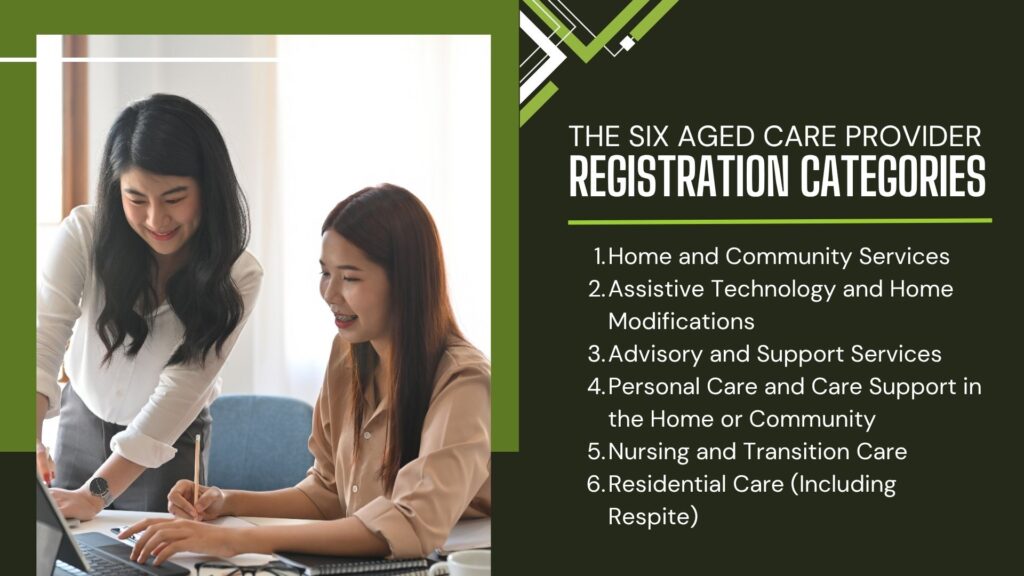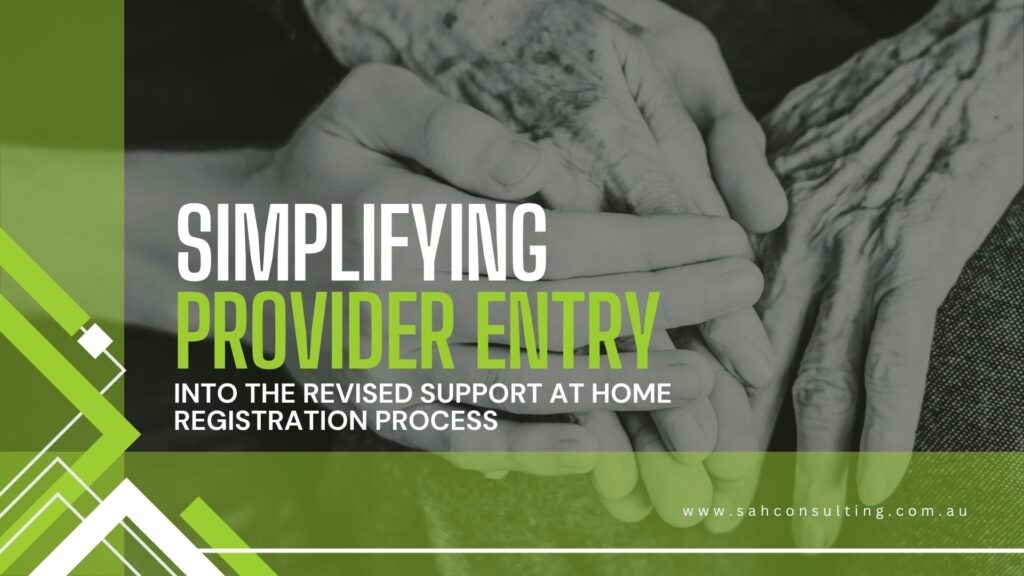The Australian Government is rolling out the Support at Home program as part of major aged care reforms prompted by the Royal Commission into Aged Care Quality and Safety. Aligned with Principle 1 of the Aged Care Taskforce, the program aims to help older Australians live safely and independently at home for as long as possible. It’s expected to benefit around 1.4 million people.
From July 2025, providers must meet new requirements under the Aged Care Act 2024, including registering under specific aged care provider registration categories to continue delivering Support at Home services. Existing Home Care Package (HCP) and Short-Term Restorative Care (STRC) providers will be automatically placed into appropriate categories, subject to confirmation.
In this article, we’ll break down the key changes in the Aged Care Act 2024, including new registration rules, deeming arrangements, and increased regulatory oversight for Support at Home providers.
Key Changes Under the Aged Care Act 2024
A lot of changes will come into effect under the new legislation. As a provider, it’s important that you understand the key changes and how they impact your operations. Here are some of the most significant changes:
A Rights-Based Approach to Aged Care
The Aged Care Act 2024 introduces a rights-based framework to ensure older Australians receive quality care that respects their dignity and choices. A new Statement of Rights outlines the entitlements of aged care recipients, holding providers accountable for upholding these standards.
Aged care providers are now legally responsible for upholding these rights. Strict oversight and enforcement will apply to ensure all services meet the expected standards. Any unregistered aged care provider offering services outside the approved framework may face serious penalties and restrictions.
New Registration Model for Aged Care Providers
The new registration model requires aged care providers to register under six categories based on their services. Existing Home Care Package (HCP) and Short-Term Restorative Care (STRC) providers will be deemed into relevant categories, subject to confirmation. National Aboriginal and Torres Strait Islander Flexible Aged Care (NATSIFAC) and Commonwealth Home Support Programme (CHSP) providers will also be integrated into this system.
The Six Aged Care Provider Registration Categories

- Home and Community Services: This category includes everyday support services that help older Australians remain independent in their own homes. It covers tasks like cleaning, home maintenance, meal delivery, and transport to appointments or social activities.
- Assistive Technology and Home Modifications: Providers in this group offer equipment and home improvements that make daily life safer and easier. Services may include fitting handrails, installing ramps, or supplying mobility aids.
- Advisory and Support Services: This category focuses on personal support and community engagement. It includes help for people experiencing hoarding or squalor, as well as social programs to reduce loneliness and promote inclusion.
- Personal Care and Care Support in the Home or Community: These services offer direct care to support day-to-day living. This includes help with bathing, dressing, allied health, nutrition, and various types of respite care.
- Nursing and Transition Care: This category is for providers offering clinical nursing services and help during care transitions, such as returning home after a hospital stay. Services include wound care, medication support, and post-acute care planning.
- Residential Care (Including Respite): Providers deliver 24/7 care in aged care homes, covering accommodation, personal care, health services, and specialised respite. These services must meet high standards for quality and safety.
The new model introduces clearer service categories and stricter compliance requirements. Providers must ensure their services align with the appropriate classification, while existing HCP and STRC providers will undergo an automatic deeming process to determine their category, subject to confirmation.
Strengthened Aged Care Quality and Safety Regulations
The Aged Care Quality and Safety Commission (ACQSC) will have expanded powers to monitor, enforce, and regulate aged care services. The updated Aged Care Quality Standards focus on person-centred care, ensuring services align with individual needs and preferences. Compliance requirements will vary based on service types, with stricter oversight to address risks and improve accountability.
Financial and Prudential Standards for Providers
New financial regulations will require providers to demonstrate financial stability, including liquidity management and risk mitigation. Stricter reporting and audit obligations will enhance transparency and ensure funding is used appropriately. Additional protections will safeguard residents’ financial interests, reinforcing accountability in financial management.
Enhanced Worker Screening and Accountability
A new Aged Care Worker Screening Check will be introduced for risk-assessed roles to improve workforce integrity. Registered providers and responsible persons must ensure their staff meet the screening and compliance requirements. The removal of strict liability offences and criminal sanctions marks a shift towards a risk-based approach to accountability.
SAH Consulting: Supporting Providers Through the Transition
SAH Consulting makes it easier for providers to navigate the new Support at Home (SAH) registration process. Our experienced team supports aged care providers through every step of the transition, helping them understand and meet the financial, governance, and compliance requirements set out in the Aged Care Act 2024. With tailored advice and practical solutions, we ensure your business stays financially stable, runs efficiently, and meets the updated Aged Care Quality Standards focused on person-centred care.
Understanding the latest SAH registration rules and compliance requirements can be overwhelming. Our team simplify the process by providing:
- Regulatory Clarity – We break down the new aged care standards, offering clear guidance on compliance and service registration.
- Application Support – Our team ensures your registration documents are complete, accurate, and aligned with the new regulatory framework.
- Policy and Procedure Documentation – We help develop comprehensive policies and procedures that meet compliance and governance expectations.
- Ongoing Advisory Services – We address challenges, answer questions, and assist with risk management throughout the transition.
- Minimising Delays – By navigating potential roadblocks, we help providers avoid common pitfalls and ensure a smooth approval process.
With our help, providers can focus on delivering quality aged care services while we handle the regulatory complexities. Whether you’re a new entrant or an existing provider adjusting to the reforms, our expertise ensures a seamless transition from registration to revenue.
Final Thoughts
The move to the Support at Home program marks a major shift in Australia’s aged care sector, placing greater focus on quality care, strong operations, and meeting strict compliance standards. While the changes may seem challenging at first, they offer aged care providers the chance to improve how they deliver services and better respond to the needs of older Australians. Understanding and aligning with the new aged care provider registration categories is a key step in staying compliant and future-ready.
The new Support at Home registration doesn’t have to be overwhelming–SAH Consulting is here to guide you through every step. Get in touch with us today for a free consultation, and let’s discuss how we can support your aged care business in adapting to these changes.
For Guest Post
A Guide To Aged Care Provider Registration
Aged care is one of those topics most people put off thinking about… until it’s suddenly urgent. And when that moment comes, the maze of forms, rules, and payment options can feel more complicated than it needs to be.
Here’s the thing: getting the right care isn’t just about finding a provider you like. It’s about making sure the numbers stack up, the support is in place, and the plan is built to last. That’s where good, down-to-earth advice makes all the difference. SAH Consulting works with families, individuals, and aged care providers to turn all that confusion into a clear path forward.
Why a Little Foresight Goes a Long Way
Rushed decisions often lead to costly compromises. Maybe the provider you wanted has no vacancies, or the funding you could’ve accessed is now off the table. Planning ahead gives you room to:
- Compare providers without the pressure of a ticking clock
- Find out which government programs could cover part of your costs
- Match care needs to a realistic, sustainable budget
Just think of it like choosing a house. You wouldn’t sign a contract after looking at one property for ten minutes. Aged care deserves the same breathing space.
The Support at Home Shift
For those wanting to stay in familiar surroundings, the Support at Home program will soon be the backbone of in-home aged care. It’s designed to streamline services so you can get a tailored mix of help without juggling multiple systems.
While the program was originally due sooner, it’s now set to roll out in November 2025. That extra time isn’t a delay to be frustrated about, it’s a window to get organised.
When it launches, services will be grouped into six key areas:
- Home and Community Services – Cleaning, garden care, transport, meals.
- Assistive Technology and Home Modifications – From grab rails to mobility aids.
- Advisory and Support Services – Social groups, community activities, even help for hoarding challenges.
- Personal Care and Care Support – Bathing, dressing, nutrition, respite care.
- Nursing and Transition Care – Clinical nursing and short-term recovery after hospital.
- Residential Care (Including Respite) – 24/7 support in aged care homes.
Knowing where your needs sit makes it much easier to compare providers and apply for the right funding.
Making Paperwork Less of a Headache
Those forms, assessments, and agreements? Those are not exactly the fun part of aged care planning but it’s where a lot of families lose time and money. Every box ticked (or missed) can affect what you pay.
That’s why an experienced adviser can be worth their weight in gold. They can:
- Spot funding you didn’t know you qualified for
- Explain tricky payment structures in plain English
- Help create a plan that works now and later
Your Plan, Your Peace of Mind
Every family’s situation is different, even if the care needs look the same on paper. Maybe one person has savings they want to protect, while another is focused on staying home as long as possible. That’s why generic advice rarely works.
A tailored plan takes into account not just care needs, but lifestyle, priorities, and future changes. And when you’ve got that mapped out, you can move forward without second-guessing every decision.
The Best Time to Start? Now.
With Support at Home arriving in November 2025, there’s still time to prepare. The earlier you start, the more choice you’ll have and the smoother the transition will be when the new system begins.
If you want to skip the confusion and move straight to clarity, SAH Consulting is ready to help you put the right plan in place today. Talk to us today.
